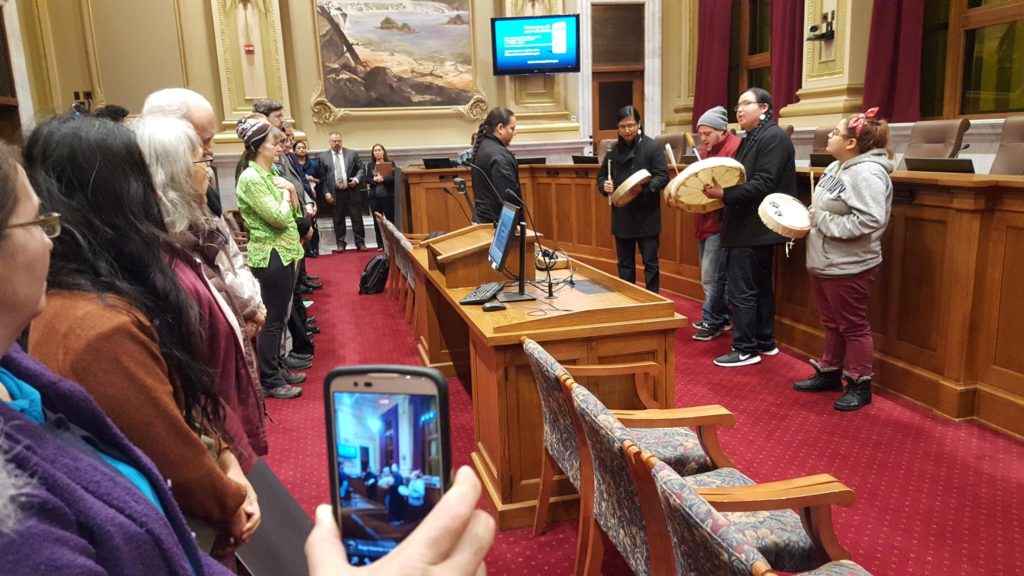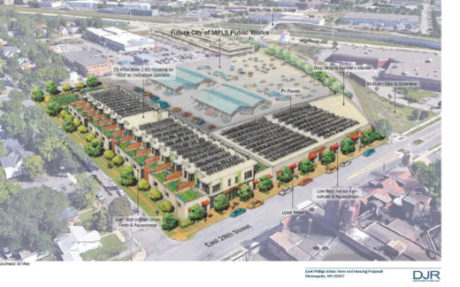Phillips community not given a voice at meetings on public works expansion

BRAD PASS
As part of a protest by Phillips residents who have been ignored by city staff and council members, a Native American Drum group performed a prayer and request for understanding prior to the Transportation and Public Works Committee meeting on Dec. 4, 2018. Throughout this process, the city has ignored its own principals and civic engagement, and sought to railroad its own plans for the neighborhood.
by Carol Pass, EPIC Board president
Neighborhood residents continue to oppose the city”'s plans to expand its public works facility into the Roof Depot/Sears site in Phillips neighborhood (1860 E. 28th St.) that would further increase pollution and illness in the area.Â
Instead, they support a plan fashioned by local residents themselves that bring jobs, affordable housing, an indoor aquaponics urban farm, solar energy, and a bike repair shop to the location along the Midtown Greenway.
Under pressure, probably from Public Works staff, to make something happen, the city scheduled meetings with the Ways & Means Committee, Transportation & Public Works Committee (T&PW), the Committee of the Whole, and the Full City Council and then rescheduled some, making notification of Urban Farm supporters difficult at best.Â
Nevertheless, Urban Farm supporters filled the council chambers and overflowed in the hall at the T&PW Committee meeting on Tuesday, Dec. 4, as a Native American Drum group performed a prayer and a request for understanding in the pre-meeting chamber. Citizens were not allowed to speak but carried signs to express their support of the Urban Farm concept.
Chair Abdi Warsame (Ward 6) passed a motion that would provide no space for the Urban Farm and permit demolition of the incredible Sears warehouse through T&PW without recommendation to the full council, with the stated hope that it could be modified to meet the needs of public works and the community.Â
On Friday, Dec. 7, 2018, the full council passed the bill, modified by Ward 9 Council Member Alondra Cano, which requires the formation of another committee, this time called HAC, which will provide “feedback” on what will be allowed in the Roof Depot site such as Voter Services, but apparently not be the Urban Farm.Â
Cano did include a statement prohibiting the demolition of the building without “input” from HAC.Â
The bill also provides an extra $950,000 for RSP, the public works architect, for “additional architectural and engineering design services” bringing their total fees to $2,700,000 to date. The Urban Farm architect was not granted extra fees.Â
The HAC will take us back a year and a half to the beginning of the GAC.Â
History and local solution:Â
In 2014 East Phillips residents looked again at solving our serious air pollution problems. More scientific evidence had become available relating the dire consequences of air pollution to our children. We were making a major effort to remove the two biggest sources of this pollution, the asphalt plant and the foundry, from the neighborhood when we heard that the owners of the Roof Depot indicated a desire to sell. Â
East Phillips Improvement Coalition (EPIC), along with neighbors and other organizations, sought to gain control of the 7 ½-acre site to prevent its sale to another polluting industry.Â
Residents and local organizations had already been pursuing the goal of green jobs and an economic future for people here with limited education. We had been lobbying the state Department of Employment and Economic Development for months for funding to try to produce a “job creator” for our low-income residents.Â
Suddenly all the things that we were most concerned about seemed to come together.Â
The community saw that the Roof Depot site could provide a pollution-free source for jobs and we would also continue to work to remove the asphalt plant and foundry.Â
Many community meetings were held as the residents and members of local organizations came together, hired a professional consultant and developed a plan to re-use the building and the whole 7 ½-acres for a community-driven sustainable low-impact industry to provide an economic future for people in Phillips, something dramatically needed and never attempted before.Â
2015 Community Plan:Â
The plan that emerged from countless meetings through 2015 and 16, the East Phillips Indoor Urban Farm project, gained traction with strong support from the Native American, Somali and Hispanic communities and other interested neighbors.Â
The community sought and found investors, presented and received unanimous endorsement of the plan from the 150 residents at the 2015 East Phillips Annual Meeting.Â
At this time, EPIC contacted and began negotiating with the owners of the Roof Depot site for purchase. Also, during this time, we learned of the city”'s interest in this property”¦ and we also learned that this interest and their plans went back over a decade without ever informing and including us.Â
In 2016, our years of lobbying with the state began to pay off. With the help of legislation sponsored by Rep. Karen Clark and senators Jeff Hayden and Patricia Torres Ray, EPIC received a Minnesota Department of Employment and Economic Development (DEED) grant to plan and help develop the East Phillips Neighborhood Indoor Urban Farm project.Â
As indicated in the grant, EPIC and others helped form an inclusive non-profit corporation with the name East Phillips Neighborhood Institute Inc. (EPNI) to be responsible for the creation of the indoor Urban Farm. The plan initially involved repurposing and reusing the entire building, adding at least 28 units of affordable family housing and creating the largest solar array in the state to power it.Â
City”'s response – Collision Course:Â
In 2015, the city threatened the use of eminent domain and the Roof Depot owners quit talking to us.Â
The City Council voted 9-4 to allow public works to purchase the building, which they did, and to convert the site to more industry ”“ the City Water and Sewer Maintenance facility.Â
Council members Cam Gordon, Jacob Frey and Andrew Johnson joined Council Member Alondra Cano in opposition.Â
As a condition of the council vote, Public Works appointed the GAC committee to determine community use should there be any un-needed space at the site.Â
As the meetings proceeded, we struggled to get the community voice heard while the city”'s space needs at the site ballooned well beyond water yard needs, even including early voting space, guaranteeing that there would be no excess space for the community.Â
In mid-2017, at the 4th GAC meeting, Staff Chair Friddle erupted angrily and threateningly to prohibited State Rep. Karen Clark from explaining how the Cumulative Pollution Legislation she wrote would affect this project. His angry fist-waving-rush across the room shocked us all.Â
Rep. Clark, saying she would not tolerate such disrespect, left the building. The Native Americans, also claiming disrespect, left followed by most of the remaining GAC members, thus terminating the GAC charade.Â
Since then, the community has been trying with no success to have meaningful negotiations with the city staff decision makers to save a 3-acre parcel with a necessary portion of the building. The community recently, to facilitate the possibility of negotiation and to meet the needs of the city and the community, reduced this to as little as 2 acres of the site – 12% of their 16+ acres. Still no response from the decision makers.Â
Negotiation requires a two-sided relationship. Where is the city?
EPIC hosted two huge community meetings at East Phillips Park in November 2017 and September 2018 with approximately 250 community members at each.Â
Votes were taken at both as to those favoring the city”'s Water Works plan or the community”'s Indoor Urban Farm Project.Â
No one at either meeting voted in favor of any of the city plans.Â
They nearly unanimously favored the 3-acre community plan (two votes at the 2017 meeting went for increasing the size of the community plan to include the entire 7 ½ acres).Â
It must be noted that a presentation of the community plan was not included on the city”'s agenda or permitted at the 2018 meeting nor was it permitted at the subsequent city council meetings listed below. So much for community engagement!
The current situation: Â
After the demise of GAC, in direct contradiction of their own principals of Community Engagement, the city has never allowed the community to present or speak at any of these meetings or decision-making sessions. The number one principal of community engagement states:
“Right to be involved ”“ Public participation is based on the belief that those who are affected by a decision have a right to be involved in the decision-making process”. (Passed by Mpls. City Council in 2007 ”“ updated in 2014)Â
There has been absolutely no effort by the city to understand, honor or even hear of the hard work of the community or abide by the principals of the Blueprint of Equitable Engagement endorsed by the city of Minneapolis.
The East Phillips Community has a reputation for not taking “NO” as an answer.
Ethical Imperative:Â
The Roof Depot site has become the focal point of a struggle in East Phillips over the community”'s self-determination and its right to protect its children from harm.Â
This is not some abstract “feel-good” concept as some have suggested.Â
It is based on the belief that residents should have the right to protect their children and themselves from the very serious health-challenging and life-destroying effects of asthma, ADHD and cancer, caused by hazardous air pollution from the heavily polluting industries already in the Roof Depot area.Â
The many additional huge diesel trucks coming with the proposed City Water Yard project along with hundreds of employee vehicles will add to the cumulative pollution already emanating from adjacent asphalt plant, foundry and roadways. Â
These major industries are only a fence or an alleyway”'s distance from family housing and apartments with many small children and their playground as well as a major daycare center, and it is less than a block from the largest urban Native American population in the United States, Little Earth of United Tribes”' with their large population of children and many vulnerable adults.Â
That parents and friends of the neighborhood should fight against this pollution and try to mitigate it as well as the dangerous traffic congestion should surprise no one. Frankly, it is a duty incumbent on all of us, especially city leaders, to try to mitigate negative impacts on low-income families and children with few resources.Â
The objections of the neighborhood should be responded to by the city with generosity and a clear effort to assist those who are trying to better a situation that has pulled down the lives of the people of East Phillips for generations.Â
The community is saying, “Enough is enough.”Â
The neighborhood families have hosted this life-damaging situation long enough. They wonder why city leaders will not listen, understand and respond.











[…] Read all about it in the Alley Newspaper: Residents Storm City Hall to Protest: Phillips Community Not Given a Voice at Meetings on Public Wor… […]